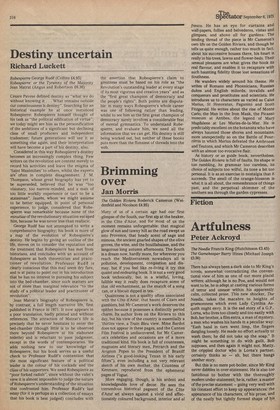Brimming Over
Jan Morris
The Golden Riviera Roderick Cameron (Weidenfeld and Nicolson £4.95)
Many of us of a certain age had our first glimpse of the South, our first sip at the beaker, in the Cote d'Azur, and for most of us the moment remains unforgettable: that magical glow of sun and tawny hill as the road swept us into Provence, that heady scent of sage and mimosa, the ancient gnarled shapes of the olive groves, the wine, and the bouillabaisse, and the langorous long autumn afternoons. The South is a dream now, hardly more, for wherever you reach the Mediterranean nowadays all is pollution, development, congestion and dismay, but if you feel like re-living it try this quaint and endearing book. It is not a very good book technically, but in a wistful, loving, fallible way it really does recapture some of that old enchantment, as the snatch of a song can, or a biscuit dipped in tea.
Quaintness is not a quality often associated with the COte d'Azur, that haunt of Czars and gamblers, but Mr Cameron's work deserves the epithet because it possesses a distinctly period charm. Its author lives on the Riviera to this day, but his view of the country is essentially a 'thirties view, a Train Bleu view. Mme Bardot does not appear in these pages, and the Cannes Film Festival is undiscovered, for Mr Cameron's celebrities and occasions are of a more traditional kind. His book is full of countesses, magnates and literary men, Petrarch and the Avignon Popes to the President of Braniff Airlines ("a good-looking Texan in his early fifties"), even including a not very relevant sketch of his own mother, the Countess of Kenmare, reproduced from the ephemeral pages of Vogue.
More engaging, though, is his ardent and knowledgeable love of decor. He sees the tremendous historical pageant of the Cote d'Azur set always against a vivid and affectionately coloured background, interior and al fresco. He has an eye for curtains and wall-papers, follies and belvederes, vistas and glimpses, and above all for gardens. The binding thread of the piece is Mr Cameron's own life on the Golden Riviera, and though he tells us quite enough, rather too much in fact, about his successive houses there, his heart is really in his trees, lawns and flower-beds. Their sensual pleasures are what gives the book its real flavour, and enables it to recapture with such haunting fidelity those lost sensations of Southness.
He wanders widely around his theme. He writes of Romans and Phoenicians, Russian dukes and English milords, invalids and conquerors and prostitutes and scientists. He introduces us to characters as varied as Caius Marius, St Honoratus, Paganiniand Scott Fitzgerald. He writes about the rise of Monte Carlo, the Man in the Iron Mask, the Picasso museum at Antibes, the legend of Mary Magdalene at Les Maries-de-la-Mer. He is predictably excellent on the botanists who have always haunted those shores and mountains, more unexpectedly so on the Battle of Pourrieres in which Marius defeated the Ambrones and Teutons, and which Mr Cameron describes with an almost too evocative flair.
As history or as guide book, nevertheless, The Golden Riviera is full of faults. Its shape is too rambling, its grammar too careless, its choice of subjects too wilful, its tone a bit too personal. It is as an exercise in nostalgia that it succeeds. The smell of the orange-blossom is what it is all about, the remembrance of things past, and the perpetual shimmer of the southern sea through the garden cypresses.


































 Previous page
Previous page